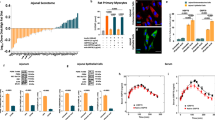Abstract
Heat shock proteins are intracellular proteinsassociated with a generalized response of cells tostress. The purpose of this study was to assess RNAlevels of heat shock protein 70 and 90 in fed or fasted rat livers during ischemia-reperfusion.Northern blot analysis of heat shock proteins wasperformed. Adenosine triphosphate and glutathione wereassessed. In baseline conditions, livers of fasted ratsshowed a twofold increase in mRNA for both heat shockproteins and 38% and 43% reductions in adenosinetriphosphate and glutathione, respectively, whencompared with organs from fed rats. After ischemia,livers of fasted rats presented a twofold decrease inheat shock protein mRNA, while no changes were observedin livers of fed rats; reduced glutathione and adenosinetriphosphate decreased 55% and 50% in fasted livers and 25% and 20% in fed organs,respectively. After 120 min of reperfusion, heat shockprotein mRNA rose threefold in fasted livers, while aslight decrease was observed in the fed group; reduced glutathione and adenosine triphosphate returnedto 65% and 70% of baseline values in fasted livers and85% and 90% in fed organs, respectively. In conclusion,the nutritional status affects heat shock protein expression determined by reperfusion. Thereduced antioxidant status leading to increasedoxidative stress could be the mechanism underlying thephenomenon.
Similar content being viewed by others
REFERENCES
Rymsa B, Wang JF, De Groot H: O2 release by activated Kuppfer cells upon hypoxia-reoxygenation. Am J Physiol 261:G602-G607, 1991
Broughan TA, Jin GF, Papacostantinou J: Early gene response to hepatic ischemia/reperfusion. J Surg Res 63:98 -104, 1996
Schoeniger LO, Reilly P, Bulkley GB, Buchman TG: Molecular biology of circulatory shock. V. Heat shock gene expression exclude s hepatic acute phase gene expression following resuscitation from hemorragic shock. Surgery 112:355-363, 1992
Schoeniger LO, Andreoni KA, Ott GR, Risby TH, Bulkley GB, Udelsman R, Burdick JF, et al: Induction of heat-shock gene expression in postischemic pig liver depends on superoxide generation. Gastroenterology 106:177-184, 1994 (zaq;2
Schiaffonati L, Rappocciolo E, Tacchini L, Cairo G, Bernelli-Zazzera A: Reprogramming of gene expression in postischemic rat liver: Induction of proto-oncogenes and hsp 70 gene family. J Cell Physiol 143:79 -87, 1990
Li GC: Induction of thermotolerance and enhanced heat shock protein synthesis in Chinese hamster fibroblast by sodium arsenite and by ethanol. J Cell Physiol 115:116 -122, 1983
Watowich SS, Morimoto RI: Complex regulation of heat shock and glucose responsive genes in human cells. Mol Cell Biol 8:393-405, 1988
Hightower LE: Heat shock, stress protein, chaperones, and proteotoxicity. Cell 66:191-197, 1991
Schiaffonati L, Tacchini L, Pappalardo C: Heat shock response in the liver: Expression and regulation of the HSP70 gene family and early response genes after in vivohyperthermia. Hepatology 20:975-983, 1994
Chomczynsky P, Sacchi N: Single step method of RNA extraction by acid guanidinium thiocyanate -phenol-chloroform extraction. Anal Biochem 162:156 -159, 1979
Cairo G, Bardella L, Schiaffonati L, Arosio P, Levi S, Bernelli-Zazzera A: Multiple mechanisms of iron-induced ferritin synthesis in He La cells. Biochem Biophys Res Commun 133:314 - 321, 1985
Tietze F: Enzymatic method for quantitative determination of nanogram amounts of total and oxidated glutathione: Applications to mammalian blood and other tissue. Anal Biochem 27:502-522, 1969
Donne lly TJ, Sievers RE, Vissern FLJ, Welch WJ, Wolfe CL: Heat shock protein induction in rat hearts: a role for improved myocardial salvage after ischemia and reperfusion? Circulation 85:769 -778, 1982
Perdrizet GA, Kaneko H, Buckley TM, Fishman MS, Pleau M, Bow L, Schweizer RT: Heat shock and recovery protects renal allografts from warm ischemic injury and enhances HSP 72 production. Transplant Proc 25:1670 -1673, 1993
Van Why SK, Hildebrandt F, Ardito T, Mann AS, Siegel NJ, Kashgarian M: Induction and intracellular location of HSP 72 after renal ischemia. Am J Physiol 263:F769 -F775, 1992
Currie RW, Tanguay RM, Kingma JG: He at shock response and limitation of tissue necrosis during occlusion/reperfusion in rabbit hearts. Circulation 87:963-971, 1993
De Groot H, Brecht M: Reoxygenation injury in rat hepatocytes: medication by O2/H2O2 liberated by sources other than xanthine oxidase. Biol Chem Hoppe Seyler 372:35-41, 1991
Buchman TG, Cabin DE, Vickers S, Deutschman CS, Delgado E, Sussman MM, Bulkley GB: Molecular biology of circulatory shock. Expression of four groups of hepatic genes is enhanced following re suscitation from cardiogenic shock. Surgery 108:559 -566, 1990
Blake MJ, Gershon D, Fargnoli J, Holbrook NJ: Discordant expression of heat shock protein mRNAs in tissue of heat-stressed rats. J Biol Chem 25:15275-15279, 1990
Xia E, Rao G, Van Remmen H, Heydari AR, Richardson A: Activities of antioxidant enzymes in various tissues of male Fischer 344 rats are altearted by food restriction. J Nutr 125:195-201, 1995
Gasbarrini A, Borle AB, Fargharli H, Bender C, Francavilla A, Van Thiel DH: Effect of anoxia on intracellular ATP, Na+, Ca++ and cytotoxicity in rat hepatocytes. J. Biol Chem 267(10):6654 -6663, 1992
Gasbarrini A, Borle AB, Fargharli H, Caracini P, Francavilla A, Van Thiel DH: Fasting enhances the effects of anoxia on ATP, Ca+ and cell injury in isolated rat hepatocytes. Biochim Biophys Acta 1178:9 -19, 1993
Gasbarrini A, Colantoni A, Di Campli C, De Notariis S, Masetti M, Iovine E, Mazziotti A, Massari I, Gasbarrini G, Pola P, Bernardi M: Intermittent anoxia reduce s oxygen free radicals formation during reoxygenation in rat hepatocytes. Free Radic Biol Med 23:1067-1072, 1997
Gasbarrini A, Caraceni P, Colantoni A, De Notariis S, Facchini A, Roda E, Van Thiel DH, Gasbarrini G, Bernardi M: Nutritional status affects the sensitivity to anoxia/reoxyge nation in hepatocytes. Transplant Proc 26:3408 -3409, 1994
Rights and permissions
About this article
Cite this article
Gasbarrini, A., Esposti, S.D., Di Campli, C. et al. Effect of Ischemia-Reperfusion on Heat Shock Protein 70 and 90 Gene Expression in Rat Liver: Relation to Nutritional Status. Dig Dis Sci 43, 2601–2605 (1998). https://doi.org/10.1023/A:1026630706426
Issue Date:
DOI: https://doi.org/10.1023/A:1026630706426




